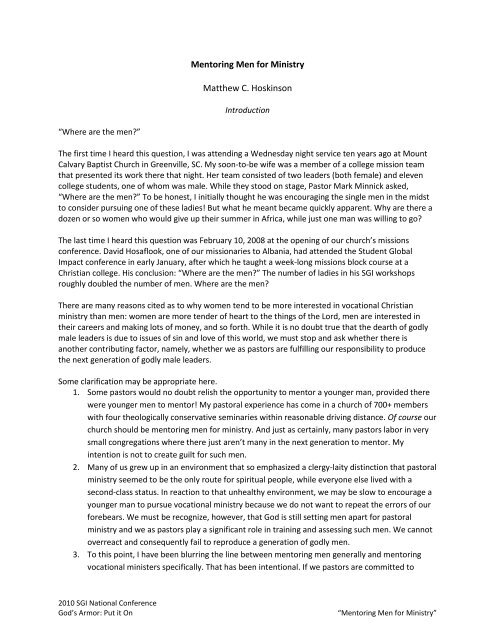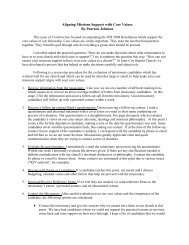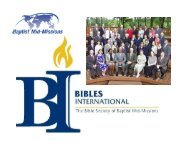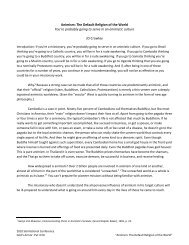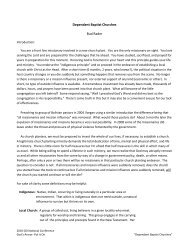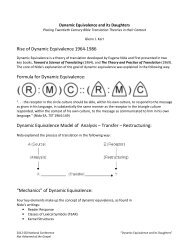Mentoring Men for Ministry Matthew C. Hoskinson - Missions Mandate
Mentoring Men for Ministry Matthew C. Hoskinson - Missions Mandate
Mentoring Men for Ministry Matthew C. Hoskinson - Missions Mandate
Create successful ePaper yourself
Turn your PDF publications into a flip-book with our unique Google optimized e-Paper software.
“Where are the men?”<br />
<strong><strong>Men</strong>toring</strong> <strong>Men</strong> <strong>for</strong> <strong>Ministry</strong><br />
<strong>Matthew</strong> C. <strong>Hoskinson</strong><br />
Introduction<br />
The first time I heard this question, I was attending a Wednesday night service ten years ago at Mount<br />
Calvary Baptist Church in Greenville, SC. My soon-to-be wife was a member of a college mission team<br />
that presented its work there that night. Her team consisted of two leaders (both female) and eleven<br />
college students, one of whom was male. While they stood on stage, Pastor Mark Minnick asked,<br />
“Where are the men?” To be honest, I initially thought he was encouraging the single men in the midst<br />
to consider pursuing one of these ladies! But what he meant became quickly apparent. Why are there a<br />
dozen or so women who would give up their summer in Africa, while just one man was willing to go?<br />
The last time I heard this question was February 10, 2008 at the opening of our church’s missions<br />
conference. David Hosaflook, one of our missionaries to Albania, had attended the Student Global<br />
Impact conference in early January, after which he taught a week-long missions block course at a<br />
Christian college. His conclusion: “Where are the men?” The number of ladies in his SGI workshops<br />
roughly doubled the number of men. Where are the men?<br />
There are many reasons cited as to why women tend to be more interested in vocational Christian<br />
ministry than men: women are more tender of heart to the things of the Lord, men are interested in<br />
their careers and making lots of money, and so <strong>for</strong>th. While it is no doubt true that the dearth of godly<br />
male leaders is due to issues of sin and love of this world, we must stop and ask whether there is<br />
another contributing factor, namely, whether we as pastors are fulfilling our responsibility to produce<br />
the next generation of godly male leaders.<br />
Some clarification may be appropriate here.<br />
1. Some pastors would no doubt relish the opportunity to mentor a younger man, provided there<br />
were younger men to mentor! My pastoral experience has come in a church of 700+ members<br />
with four theologically conservative seminaries within reasonable driving distance. Of course our<br />
church should be mentoring men <strong>for</strong> ministry. And just as certainly, many pastors labor in very<br />
small congregations where there just aren’t many in the next generation to mentor. My<br />
intention is not to create guilt <strong>for</strong> such men.<br />
2. Many of us grew up in an environment that so emphasized a clergy-laity distinction that pastoral<br />
ministry seemed to be the only route <strong>for</strong> spiritual people, while everyone else lived with a<br />
second-class status. In reaction to that unhealthy environment, we may be slow to encourage a<br />
younger man to pursue vocational ministry because we do not want to repeat the errors of our<br />
<strong>for</strong>ebears. We must be recognize, however, that God is still setting men apart <strong>for</strong> pastoral<br />
ministry and we as pastors play a significant role in training and assessing such men. We cannot<br />
overreact and consequently fail to reproduce a generation of godly men.<br />
3. To this point, I have been blurring the line between mentoring men generally and mentoring<br />
vocational ministers specifically. That has been intentional. If we pastors are committed to<br />
2010 SGI National Conference<br />
God’s Armor: Put it On “<strong><strong>Men</strong>toring</strong> <strong>Men</strong> <strong>for</strong> <strong>Ministry</strong>”
mentoring men in our assemblies, by default we will likely be mentoring men <strong>for</strong> vocational<br />
ministry. But regardless of whether a man chooses to pursue ministry <strong>for</strong> his full-time<br />
employment, the church needs male leaders—staff and lay—and we must recognize and own<br />
our responsibility to prepare these men <strong>for</strong> leadership.<br />
And so our topic: <strong><strong>Men</strong>toring</strong> <strong>Men</strong> <strong>for</strong> <strong>Ministry</strong>. <strong><strong>Men</strong>toring</strong> has become a bit of a buzzword today. I’d like<br />
to begin by setting the concept of mentoring within its broader biblical context. And <strong>for</strong> that, we need to<br />
turn to <strong>Matthew</strong> 28 and review the Great Commission.<br />
I. <strong><strong>Men</strong>toring</strong> and Discipleship (<strong>Matthew</strong> 28.16-20)<br />
Christ’s statement in vv. 18-20 has three distinct elements: v. 18 is (1), vv. 19-20a are (2), v. 20b is<br />
(3). The structure is A-B-A: indicative (what is true), imperative (our responsibility in light of what is<br />
true), indicative. This pattern <strong>for</strong>ms the structure of this first point.<br />
A. Indicative: Christ Rules Everywhere (18).<br />
o From the beginning of his Gospel, <strong>Matthew</strong> has emphasized Christ’s authority, his right to<br />
rule (1.1, 6-11)<br />
o But how would he come to the throne? What would be the story between his genealogy in<br />
ch. 1 and this statement in ch. 28? Through a gradual ascension to the throne? No. His<br />
exaltation would come through his humiliation (e.g., 3.13-17 – humbly baptized by John;<br />
4.1-10 – humbly defeating temptation by the power of the Spirit; 21.6 – even what we call<br />
his Triumphal Entry, the Scripture that he fulfills says, Behold, your king is coming to you,<br />
humble, and mounted on a donkey)<br />
o Sure, there are shades of his authority throughout the book (e.g., his authority expressed in<br />
the Sermon on the Mount), yet the trajectory through the gospel is ever downward, to the<br />
very point of death, even death on a cross.<br />
o This is the Son of David? This is the King who has authority on earth to <strong>for</strong>give sins? Dying a<br />
criminal’s death?<br />
o This is where you’d be left after reading 28 ½ out of 29 pages (that’s in my little ESV). And<br />
then comes the last chapter and the first day of the week and the women going to the tomb<br />
and an angel seated on the stone and the words, Do not be afraid, <strong>for</strong> I know that you seek<br />
Jesus who was crucified. He is not here, <strong>for</strong> he has risen, as he said.<br />
o And you say, “What just happened?” And Paul tells you, God raised him from the dead and<br />
seated him at his right hand in the heavenly places far above all rule and authority and<br />
power and dominion, and above every name that is named, not only in this age but also in<br />
the one to come (Ep 1.20-22). And God has bestowed on him the name that is above every<br />
name, so that at the name of Jesus every knee should bow, in heaven and on earth and<br />
under the earth, and every tongue confess that Jesus Christ is Lord, to the glory of God the<br />
Father (Ph 2.9-11).<br />
o Thus Jesus says, All authority in heaven and on earth has been given to Me. Nothing lies<br />
outside my jurisdiction. No challenger can usurp my throne. Not even death itself can defeat<br />
me. It’s all Mine.<br />
2010 SGI National Conference<br />
God’s Armor: Put it On “<strong><strong>Men</strong>toring</strong> <strong>Men</strong> <strong>for</strong> <strong>Ministry</strong>”<br />
2
o Transition: Christ tells us the means by which the nations come.<br />
B. Imperative: So disciple the nations (19-20a)<br />
o Command: disciple all nations (maqhteu,sate pa,nta ta. e;qnh)<br />
o disciple = one who learns by following; not simply a convert<br />
o make disciples of all nations (ESV, NASB, NET, CSB, NIV, NKJV)<br />
We must not understand of as partitive (i.e., from all the nations make<br />
disciples).<br />
all nations is the DO: i.e., make all nations disciples.<br />
Christ’s reasoning: “I rule everywhere, so make disciples everywhere. It’s<br />
not just <strong>for</strong> Israel anymore.”<br />
The means by which Christ, to whom all authority everywhere is given, is<br />
served by all nations is the church!<br />
o Components: what this involves<br />
o baptizing (19b)<br />
Baptism = the initiatory rite of the Christian church. We welcome professing<br />
believers into the church upon baptism.<br />
o teaching (20a) = “to provide instruction in a <strong>for</strong>mal or in<strong>for</strong>mal setting” (BDAG,<br />
1957.2.f.).<br />
all that I have commanded you. This includes the content of Jesus’ teaching<br />
in the gospels. But Acts teaches what Jesus continued to do, and the Epistles<br />
were written under the Spirit and came as a command of the Lord. “Thus in<br />
a larger sense, ‘all that Jesus commanded’ includes all of the NT” (Grudem,<br />
ST, 27).<br />
Not teaching them all or teaching them to know all that I have commanded<br />
you, but teaching them to do all that I have commanded you.<br />
Two implications:<br />
For teachers/preachers of the Word, application is vital. Note<br />
Keller’s statement from Dt 29.29 that the Bible is a covenant<br />
document (cp. Js 1.19). There<strong>for</strong>e, application is not something we<br />
tack onto a sermon; it is the sermon.<br />
This cannot be done solely in a <strong>for</strong>mal setting. No teacher can trace<br />
every text to every application, nor every situation to every text. We<br />
need individual help in learning how to do all that Christ has<br />
commanded. Thus SGs, pastoral counseling, coffee with a friend.<br />
o Presupposition: as you go (19a) = wherever you go<br />
o Mild imperatival <strong>for</strong>ce, but not the central responsibility.<br />
o Not saying, When you go to Haiti on a mission trip, make disciples.<br />
o You’re in the US right now? OK, wherever you go here, make disciples.<br />
o Implication: everyone you meet is a potential follower of Christ.<br />
o Application: where are you going? As you go, make disciples. As you go, wherever<br />
you go, always be discipling!<br />
2010 SGI National Conference<br />
God’s Armor: Put it On “<strong><strong>Men</strong>toring</strong> <strong>Men</strong> <strong>for</strong> <strong>Ministry</strong>”<br />
3
C. Indicative: Christ is Present Everywhere (20b).<br />
o Statement: behold I am with you always.<br />
o This Sovereign-over-all supports us with his presence.<br />
Emphasis is not so much on his presence as it is his assistance.<br />
meta, = “in reference to supportiveness be with someone, stand by, help<br />
someone” (BDAG, 4637.A.2.a.g.b.).<br />
o How is this true? The Spirit of Christ is with us. Ro 8.9-10 equates the Spirit of Christ<br />
being in us with Christ himself being in us.<br />
o Perhaps explains why <strong>Matthew</strong> doesn’t record the ascension.<br />
“That Jesus does not ascend is a fitting sign of his eternal presence: the risen<br />
Lord remains with his people” (Davies & Allison, 3.687).<br />
o Forms an inclusio with 1.23: vEmmanouh,l, meq’ h`mw/n qeo,j.<br />
o Implication: wherever you go, Christ is there.<br />
o Just as you cannot leave the authority of Christ, so too you cannot leave the<br />
presence of Christ. And notice how this statement transcends time and space: I am<br />
with you [no matter the location] always [no matter the time].<br />
o Adding to the end of the age shows that this statement wasn’t just <strong>for</strong> the original<br />
disciples, but the disciples of the disciples—all the way down to you and me. Jesus is<br />
with us.<br />
o Application: You have great freedom to try—and fail!—to make others followers of Jesus.<br />
You’re not a one-man show; Christ himself is with you and his Spirit is in you to accomplish<br />
his will!<br />
II. <strong><strong>Men</strong>toring</strong> and <strong>Ministry</strong> (2 Timothy 2.1-2)<br />
A. Prerequisites <strong>for</strong> <strong><strong>Men</strong>toring</strong><br />
o Grace-empowered living: be strengthened by the grace that is in Christ Jesus<br />
o A mentor is not someone who has arrived. Far from it. He is someone who is still<br />
running the race, just a little bit further ahead.<br />
o be strengthened (evndunamou/)<br />
present = go on being strengthened<br />
passive = the strength lies outside yourself<br />
o the grace that is in Christ Jesus points to the means of grace: Word, prayer, and<br />
fellowship<br />
o We who mentor others are still growing in our walk with Christ, and quite often we<br />
learn more from those we’re mentoring than we are able to impart to them.<br />
o Teachable spirit: the things you have heard from me<br />
o Teachers do not have all the answers. Pastors do not have all the answers. Even<br />
though we are called to answer people’s questions, we ourselves are not the<br />
answer. We are subject to the Word, and our answers are only helpful as they<br />
reflect the clear teaching of Scripture.<br />
2010 SGI National Conference<br />
God’s Armor: Put it On “<strong><strong>Men</strong>toring</strong> <strong>Men</strong> <strong>for</strong> <strong>Ministry</strong>”<br />
4
B. Aspects of <strong><strong>Men</strong>toring</strong><br />
o Relationship<br />
o commit presumes a relationship. Consider how Paul himself fulfilled this command<br />
to Timothy. He had heard from others and had passed it on to Timothy. In the<br />
process, the two shared such a relationship that the mentor would regularly refer to<br />
the younger as his son (v. 1).<br />
o Truth<br />
o <strong><strong>Men</strong>toring</strong> is not simply about building relationships; it’s about building<br />
relationships <strong>for</strong> the purpose of advancing the truth of the gospel. Thus these<br />
relationships Timothy must cultivate center on what he has heard from Paul.<br />
o Assessment<br />
o This aspect is introduced by the term faithful. The elder must carefully assess those<br />
he is mentoring, always assessing his growth in Christ, the direction of his heart, his<br />
inclinations, and so <strong>for</strong>th. The elder is shepherding, thinking, praying, talking,<br />
assessing.<br />
o This is why it’s so important <strong>for</strong> you to consider the local church when you choose a<br />
seminary. Too many men think only in terms of who teaches what where, but never<br />
give any consideration to the group of men that will one day assess and ordain him<br />
<strong>for</strong> pastoral ministry. When you are sent out after seminary, you want the men who<br />
lay their hands on you to actually know you! So when you visit seminaries, take time<br />
to learn about what church you will become a part of—not just where you can<br />
serve, but (more importantly?) where you can be assessed.<br />
o Goal<br />
o How will you know that you’ve “successfully” mentored someone? When they are<br />
able to teach others also. That’s the goal: not simply <strong>for</strong> the one you’re mentoring to<br />
know the truth, but <strong>for</strong> them to know it so well that they are mentoring others.<br />
C. Application of <strong><strong>Men</strong>toring</strong><br />
o Learn to look at everyone as a potential follower of Christ.<br />
o Spend increasing amounts of time with decreasing numbers of people.<br />
o Christ’s methods included public teaching and private instruction.<br />
o But he didn’t spend equal time with everyone. His disciples were simply with him;<br />
that’s why they were called followers.<br />
o Illustration: concentric circles; jot down your roles (closest friend/spouse, family, close<br />
friends, fellow church members [SG/SS/ministries], co-workers, neighbors)<br />
o Are there any unbelievers on your paper? where do they fit in?<br />
o Envision your chart in 3D, with the circles/cylinders increasing in height as you move<br />
to the center. Represents time to invest.<br />
o Illustration of Seth Rone (who was being ordained in Chattanooga, TN that very day)<br />
o You must prioritize people and help them learn to follow Christ.<br />
2010 SGI National Conference<br />
God’s Armor: Put it On “<strong><strong>Men</strong>toring</strong> <strong>Men</strong> <strong>for</strong> <strong>Ministry</strong>”<br />
5
Conclusion<br />
I love to study: the languages, learning new things, finding answers to difficult questions. And I love to<br />
preach: the praying, the planning, the nerves, watching the Spirit use the Word to change lives. But the<br />
one thing that I enjoy far more than I expected has been the opportunity to spend time with a few<br />
younger men, walk with them, teach them, learn from them, and shepherd them. If you haven’t<br />
experienced the joy of sharing your lives with a younger man whom you are mentoring—or, <strong>for</strong> that<br />
matter, with an older man who is mentoring you—I would encourage you to start praying that our<br />
Christ, that Great Shepherd of the sheep, would bring such a man into your life.<br />
<strong>Matthew</strong> is Pastor of <strong>Ministry</strong> Vision <strong>for</strong> Heritage Bible Church in Greer, SC. He served as Heritage's<br />
Pastor of Youth and Young Adult Discipleship <strong>for</strong> four years be<strong>for</strong>e assuming his current role in 2008. He<br />
and his wife Kimberly have been members of Heritage <strong>for</strong> nearly a decade. They have three beautiful<br />
daughters and a Sportscenter-watching cat named Espn.<br />
2010 SGI National Conference<br />
God’s Armor: Put it On “<strong><strong>Men</strong>toring</strong> <strong>Men</strong> <strong>for</strong> <strong>Ministry</strong>”<br />
6


